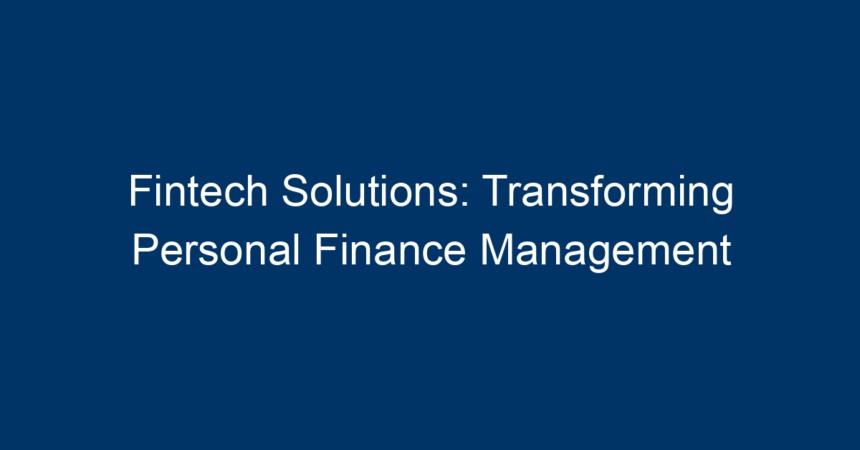In the digital age, the way we handle our personal finances has undergone a seismic shift. The advent of fintech solutions has revolutionized traditional banking practices, providing users with unparalleled access to financial tools and resources. Gone are the days when personal finance management meant keeping meticulous paper records or waiting in long bank queues. Today, innovative financial technologies allow individuals to take control of their finances with clarity and confidence. This article delves into how fintech solutions are transforming personal finance management, the benefits they offer, and practical tips on how to leverage these tools effectively.
Understanding Fintech Solutions
What Are Fintech Solutions?
Fintech, short for financial technology, refers to the integration of technology into offerings by financial services companies. Fintech solutions encompass a wide range of applications including banking, investing, budgeting, lending, and even insurance. From mobile banking apps to robo-advisors, these technologies streamline and enhance financial management for the modern consumer.
The Rise of Fintech in Personal Finance
The rapid growth of the fintech industry can be attributed to several factors:
- Accessibility: Fintech solutions simplify access to financial services, allowing users to manage their finances from anywhere, anytime.
- Customization: Tailored experiences catered to individual financial needs are a prominent feature of many fintech applications.
- Cost-Efficiency: With lower operational costs compared to traditional banks, many fintech solutions provide services at reduced rates.
Major Categories of Fintech Solutions
The diversity of fintech solutions allows users to select tools that best suit their needs, making personal finance management more efficient. Below are the major categories:
1. Mobile Banking Apps
Mobile banking apps have redefined the way consumers manage their money. Banks and fintech firms have developed user-friendly mobile apps that allow users to perform transactions, check balances, and access financial advice on-the-go. Some key features include:
- 24/7 Access: View your bank account anytime from wherever you are.
- Instant Transfers: Send and receive money with just a few taps.
- Payment Tracking: Keep tabs on your spending categories and habits.
2. Budgeting Tools
Budgeting tools are essential in tracking expenses and managing financial goals. These apps often come with:
- Automated Tracking: Syncing with your bank accounts automatically tracks incomes and expenses.
- Goal Setting: Users can set savings goals for future purchases, vacations, or emergency funds.
- Visual Reports: Graphical data visualizations help users easily interpret their spending habits.
3. Robo-Advisors
Robo-advisors utilize algorithms to provide investment advice without the need for a human advisor. This category of fintech solution has gained popularity due to:
- Low Fees: Robo-advisors typically charge lower fees compared to traditional financial advisors, making investing more accessible.
- Automatic Rebalancing: They automatically adjust portfolios based on market conditions to maintain desired asset allocation.
- Goal-Oriented Investment: Personalized investment plans based on individual risk tolerance and financial goals enhance the user experience.
4. Lending Platforms
Fintech solutions have reshaped personal lending. Online lending platforms provide quick access to loans with minimal paperwork and speedy approvals. Key attributes include:
- Credit Score Assessment: Many fintech companies use alternative data to assess borrowers, providing options for those with limited credit history.
- Competitive Rates: Personalized offers and interest rates can make loans more affordable.
- Flexible Repayment: Innovative repayment plans tailored to users’ financial situations enhance user satisfaction.
The Advantages of Fintech Solutions
Enhanced Convenience and Accessibility
Fintech solutions empower users by making financial management accessible with just a smartphone. The significant reduction in time and effort needed to manage finances leads to increased user engagement and financial literacy.
Improved Financial Awareness
With real-time data and analytics, users become more aware of their spending habits and financial situations. This improved awareness encourages smarter decision-making and fosters better financial habits.
Personalized Financial Management
Many fintech solutions employ algorithms to provide insights tailored to individual user behavior. By personalizing the financial experience, users receive recommendations that are specific to their goals, whether it’s saving for a house or planning for retirement.
Challenges Facing Fintech Solutions
While fintech has transformed personal finance management, it has not been without challenges.
1. Security Concerns
With the increase in digital transactions comes the risk of data breaches and cyberattacks. Users must ensure that any fintech solution they engage with prioritizes robust security protocols.
2. Regulatory Hurdles
As fintech continues to grow, so does the scrutiny from regulatory bodies. Compliance with regulations can pose challenges for fintech startups and established companies alike.
3. Tech Reliance
An over-reliance on technology can lead to a lack of financial literacy among users. While apps can automate many processes, understanding the underlying principles of finances is crucial.
Best Practices for Using Fintech Solutions
1. Choose Wisely
Research and select fintech solutions that align with your financial goals. Not every app will meet your needs, so look for customer reviews, features, and pricing before deciding.
2. Implement Strong Security Measures
Always use two-factor authentication, strong passwords, and regularly monitor your accounts. The safety of your financial data is paramount.
3. Stay Informed
Continuously educate yourself about new features and updates in the fintech space. Knowledge of emerging trends can help you maximize the benefits of the tools you use.
4. Balance Automation with Awareness
While automated tools serve to streamline your finance management, maintaining an understanding of your financial situation is crucial. Regularly review your financial goals and progress.
Conclusion
Fintech solutions have undeniably transformed personal finance management, making it more accessible, efficient, and personalized. As we continue to embrace these innovative technologies, it’s essential to approach them with caution and informed decision-making. By understanding the various tools available and implementing best practices, individuals can take significant strides toward achieving their financial objectives.
As the fintech landscape evolves, staying informed will ensure that you make the most of the tools at your disposal, leading to better financial health and security in the long run. Embrace the fintech revolution and empower your financial journey today!




